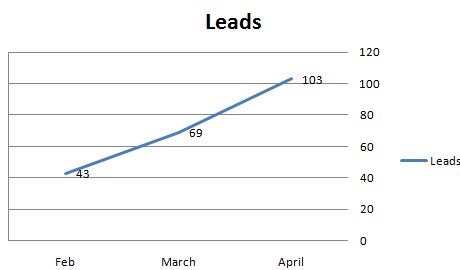Onsite SEO Work Driving Traffic and Leads
When it comes to search engine optimization, there are two primary components that lead a particular site to rank well for specific keywords: “onsite” SEO and “offsite” SEO. Both are important. Without solid onsite SEO (landing pages, internal linking, alt tags, depth of content, etc), any offsite SEO efforts you undertake are going to be minimized (best case) or completely wasted (worse case). But without offsite SEO efforts (aka link building), it’s not going to really matter how good your onsite SEO is — your site still won’t rank well without external links pointing back at your domain. Virtual Results helps our clients with both onsite and offsite SEO. Below are two charts from a client site showing the change in traffic and leads since we did some ONSITE SEO work (we haven’t done any off site work for them) a few months back.
Traffic is trending up and to the right.
Leads more than doubled. This chart doesn’t include phone calls either, just leads via the IDX.
Which direction are your traffic and leads trending? If they aren’t going up and to the right and you want world class real estate SEO help, let us know. We’re not hard to reach…








 For most Realtors, Marketing is far and away their largest expense. I have had clients that invest anywhere from 10% to 90% of their Gross Commission Income on Marketing. This can be A LOT of money. One of my clients was spending upward of $500,000 a year on marketing when I found him, and with very little feedback on what was, and wasn’t working. “We want to be everywhere” was his motto. He knew he was profitable, he just didn’t know exactly why…
For most Realtors, Marketing is far and away their largest expense. I have had clients that invest anywhere from 10% to 90% of their Gross Commission Income on Marketing. This can be A LOT of money. One of my clients was spending upward of $500,000 a year on marketing when I found him, and with very little feedback on what was, and wasn’t working. “We want to be everywhere” was his motto. He knew he was profitable, he just didn’t know exactly why…

 Catch Our Feed
Catch Our Feed Subscribe via Email
Subscribe via Email Follow Our Tweets
Follow Our Tweets Friend Us On Facebook
Friend Us On Facebook Watch Us On Youtube
Watch Us On Youtube